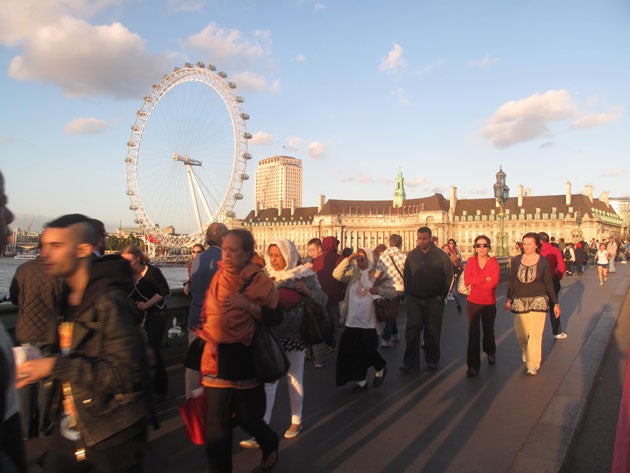Simon Calder: Taking a gamble on London's tourist industry
The man who pays his way

Your support helps us to tell the story
From reproductive rights to climate change to Big Tech, The Independent is on the ground when the story is developing. Whether it's investigating the financials of Elon Musk's pro-Trump PAC or producing our latest documentary, 'The A Word', which shines a light on the American women fighting for reproductive rights, we know how important it is to parse out the facts from the messaging.
At such a critical moment in US history, we need reporters on the ground. Your donation allows us to keep sending journalists to speak to both sides of the story.
The Independent is trusted by Americans across the entire political spectrum. And unlike many other quality news outlets, we choose not to lock Americans out of our reporting and analysis with paywalls. We believe quality journalism should be available to everyone, paid for by those who can afford it.
Your support makes all the difference.Black holes do not yet figure on the tourism agenda. Until they do, here's how to simulate the concept of time slowing almost to a standstill: join a Post Office queue in order to renew a passport or a driving licence.
To fill any resulting gaps in the space-time continuum when you enter this parallel universe, you can always strike up a conversation with fellow travellers. Last Saturday morning the man behind me whispered "Masked Marvel". Unsure whether that was a compliment, a threat or a request, I asked for more details.
"St Leger, this afternoon. I got 16 to 1 on him a month ago. You'll still get him at sixes or eights."
When I had concluded my bureaucratic business, a couple of hours in earth time still remained before the 3.10pm off at Doncaster racecourse. At William Hill, three doors down, my £10 each way on Masked Marvel at 7-1 was welcomed.
The only people who I have encountered this week taking no financial risk are the gentlemen operating the swindle known variously as the "Shell Game" or "Follow the Bee" on Westminster Bridge in central London. On Monday evening, I spent an hour watching the frenzy of commerce on this most significant link across the Thames.
Earth, concluded William Wordsworth, "hath not anything to show more fair" than the view from Westminster Bridge. In the 209 years since then, the experience has changed: from human statues to hot dogs that constitute a biological hazard, all commerce is here. The footfall is unmatched in the nation: the bridge connects Westminster Abbey and the Houses of Parliament with the London Eye, making it Britain's busiest tourist thoroughfare. With Parliament and Whitehall so close, it is also one of the most heavily policed locations in Britain. Puzzling, then, that the gangs who prey on tourists on Westminster Bridge can operate with the presumed tacit approval of the authorities.
Between 5 and 6pm on Monday, four separate "games" were going on. This is not your average casino. The dealer squats with his back to the bridge, with three matchboxes laid out on a doormat. He keeps up a patter while shuffling them, occasionally lifting one to show where a small wooden ball is located. An accomplice stimulates interest – and greed – among passers-by using the old trick of apparently winning money. Most tourists walk past, but a few pause and watch. After a few minutes, they convince themselves that they, too, can follow the game and beat the dealer, and buy into the action.
The only denomination that appeared while I watched was the £20 note. A typical victim, or "mark" quickly loses £40 or £60, and then is invited by the dealer to win back their money by deciding between only two boxes, not three. They lose again, and are usually last seen being dragged away by a furious partner who has just watched a large slab of their holiday spending disappear into a black hole.
The operators of this extreme end of the tourist economy must be delighted that the authorities show no interest in stifling the practice. Villains across Europe are no doubt getting in training for next summer's Olympics. But for the UK tourist industry, the proliferation of swindles is serious: besides the shabby image it confers on Britain, the thousands of pounds that the tricksters pocket might otherwise be spent in restaurants, hotels and tourist attractions, with a better rate of return.
Back at Doncaster, Masked Marvel romped home by three lengths. In future I shall brook no comparison of the South Yorkshire town to a gravitational singularity with infinite density.
Better late?
Aviation has always been a bit of a lottery – and now the Latvian airline, Air Baltic, has introduced a casino element into its flights. Nothing to do with the probability of your successfully travelling between Gatwick and Riga, but the time your flight arrives.
This enterprising airline has come up with a new way to make money from travellers: betting on the flight being delayed, with what it ambitiously describes as an "On-time Arrival Guarantee".
Pay €24, and if the flight arrives an hour or more late, you get your money back. A good plan? Not unless you have paid a fortune for your flight. On average, one flight in five is more than 15 minutes late, but typically at least half of those flights are delayed by less than an hour – making the odds against any particular flight meeting the criterion around 10 to 1. If you have paid, say, €240 for your trip and fancy a flutter, the odds are about right. Good luck: just don't try any tricks such as dawdling in duty free to delay the flight.
travel@independent.co.uk
Join our commenting forum
Join thought-provoking conversations, follow other Independent readers and see their replies
Comments